Who is here? 1 guest(s)
|
Chrysosoma?-->Possibly Plagiozopelma
|
|
| guplox |
Posted on 14-02-2022 15:29
|
|
Member Location: Posts: 438 Joined: 09.02.18 |
Picture taken in May, east China (Zhejiang province). Looks like a Chrysosoma but there seem to be some similar species, Amblysilopus, for example. I'm not sure if it is a Chrysosoma or something else. Thanks in advance.
Edited by guplox on 16-02-2022 10:00 |
|
|
|
| John Carr |
Posted on 14-02-2022 17:11
|
|
Member Location: Posts: 9773 Joined: 22.10.10 |
From Bickel's revision of Sciapodinae, omitting male characters: * Frons highly polished metallic blue-green ... CI with either 3-7 strong lateral spine-like setae (stronger in females than males), or CI with 3 strong black distolateral setae; FI and TI in both sexes usually without major setae ... Plagiozopelma * Vertex and frons usually with pruinosity ... CI without strong lateral spine-like setae; PI and TI usually with long setae; pedicel often with long ventral and dorsal setae ... Chrysosoma |
|
|
|
| guplox |
Posted on 15-02-2022 02:37
|
|
Member Location: Posts: 438 Joined: 09.02.18 |
Getting down to genus seems way more difficult than I expected. Thank you John Carr for the diagnostic characteristics to distinguish Chrysosoma from Plagiozopelma. |
|
|
|
| guplox |
Posted on 16-02-2022 09:59
|
|
Member Location: Posts: 438 Joined: 09.02.18 |
So first the long arista rules out Amblyspilopus, which usually has short arista. Frons highly polished metallic blue-green, which seems to match my picture. CI with either 3-7 strong lateral spine-like setae..., which is not clearly visible in my picture. FI and TI in both sexes usually without major setae, which seems to fit. So my current not very educated guess is Plagiozopelma. Thank you again John Carr for the diagnostic characters.  |
|
|
|
| Jump to Forum: |


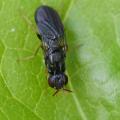



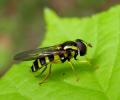
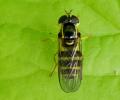

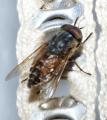
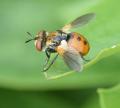



 but don't see the image in the post.
but don't see the image in the post.
